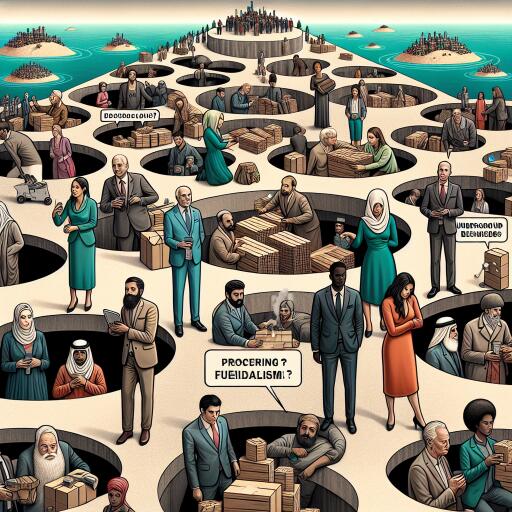Billionaires are building bunkers and buying islands — are they prepping for apocalypse or pioneering a new feudalism?
In recent years, a trend has emerged among the world’s wealthiest individuals that could easily be misconstrued as preparations for an apocalyptic scenario straight out of Hollywood. From the construction of underground bunkers to the acquisition of remote islands, billionaires seem to be securing their own fortresses against an uncertain future. But beyond the surface, their actions may signify something even more profound than survivalism. Are these billionaires merely safeguarding themselves or are they setting the stage for a new era reminiscent of feudal lords?
The picturesque Hawaiian island of Kauai has seen its own influx of billionaire interest, most notably from Meta’s CEO, Mark Zuckerberg. Zuckerberg has been steadily acquiring large plots of land to create a massive compound known as Ko’olau Ranch. The project, which aims to blend luxury with sustainability, encompasses vast areas dedicated to agriculture and wildlife preservation alongside more controversial features such as a massive underground bunker.
This fixation with fortified luxury isn’t confined to Zuckerberg alone. Other high-profile billionaires like Oprah Winfrey and Oracle’s co-founder Larry Ellison have also invested heavily in Hawaiian real estate, each carving out their own paradisiacal estates. Their endeavors go beyond mere lavish living spaces, incorporating elements that ensure self-sufficiency such as water purification and agricultural ventures.
These projects, while showcasing a commitment to preservation and sustainability, also highlight a deeper, more unsettling shift. The billionaires’ moves resemble not just a step toward self-preservation but a leap towards a modern version of feudalism—where land, resources, and even the local workforce are under the dominion of a single entity or individual.
Historically, the concept of feudalism evokes images of medieval Europe, where kings and lords owned vast lands, and the peasantry lived under their grace. Today’s technological moguls, with their almost limitless resources, are mirroring this by creating self-contained ecosystems where their word is law. This new-age feudalism, fueled by what some call “technofeudalism,” sees data and digital realms as just another territory to conquer and rule.
Yet, the allure of these billionaire projects isn’t merely their scale or their ambition but the narrative they sell—a narrative of sustainability, progress, and even benevolence. Beneath the Instagram-friendly posts of cattle-ranching and organic farming lies a stark reminder of the power these individuals wield over their adopted communities, often at the expense of local cultures and economies.
As enthralling as the concept of surviving the apocalypse in style might be, it’s crucial to recognize that these endeavors represent a mere fraction of the wealth these billionaires possess. For them, the cost of constructing a personal utopia is negligible compared to their overall net worth. This reality starkly contrasts with the financial limitations faced by the average person, for whom “prepping” can mean significant sacrifices and, at best, temporary solutions to systemic problems.
Our fascination with billionaires’ grandiose survival plans also serves as a reflection of wider societal issues, including severe global inequality. While there’s a voyeuristic pleasure in peeking into the lives of the ultra-wealthy, it’s a luxury that veils the pressing issues of our time, such as the housing affordability crisis and the environmental degradation that necessitates such survivalist thinking in the first place.
Ultimately, the trend of billionaires fortifying islands and building bunkers signals more than a quirky interest in apocalypse survival. It’s a stark reminder of the vast economic disparities that exist and a pointer towards a future where the world’s wealthiest individuals not only possess an outsized share of its resources but also shape its landscapes—physically, economically, and socially—according to their whims. In this brave new world, the lines between protection, control, and dominion blur, leaving us to ponder whether we’re witnessing the dawn of a new feudal age.









